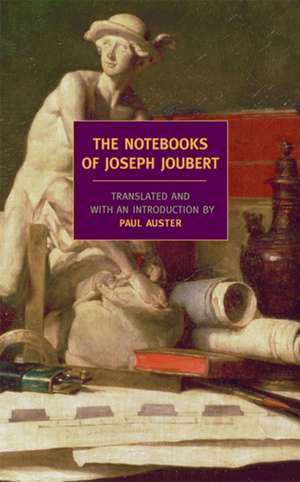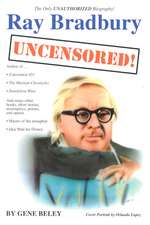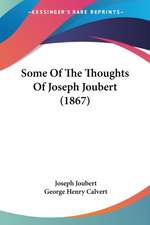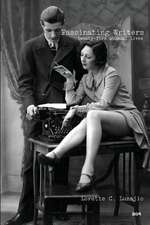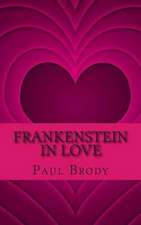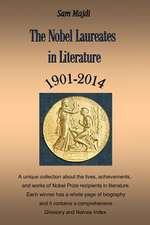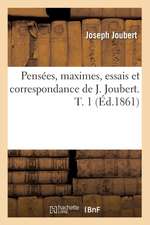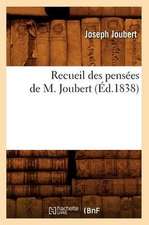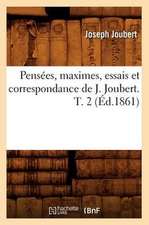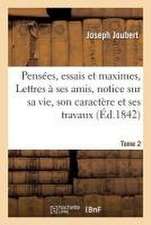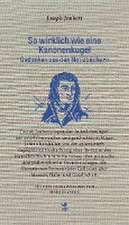The Notebooks of Joseph Joubert: A Selection: New York Review Books Classics
Autor Joseph Joubert Traducere de Paul Austeren Limba Engleză Paperback – 31 mai 2005
Din seria New York Review Books Classics
-
 Preț: 88.86 lei
Preț: 88.86 lei -
 Preț: 98.73 lei
Preț: 98.73 lei - 16%
 Preț: 79.25 lei
Preț: 79.25 lei -
 Preț: 77.73 lei
Preț: 77.73 lei -
 Preț: 124.55 lei
Preț: 124.55 lei -
 Preț: 85.16 lei
Preț: 85.16 lei -
 Preț: 83.30 lei
Preț: 83.30 lei -
 Preț: 182.08 lei
Preț: 182.08 lei -
 Preț: 102.47 lei
Preț: 102.47 lei -
 Preț: 76.46 lei
Preț: 76.46 lei -
 Preț: 174.64 lei
Preț: 174.64 lei -
 Preț: 110.73 lei
Preț: 110.73 lei -
 Preț: 119.57 lei
Preț: 119.57 lei -
 Preț: 94.01 lei
Preț: 94.01 lei -
 Preț: 96.42 lei
Preț: 96.42 lei -
 Preț: 101.24 lei
Preț: 101.24 lei -
 Preț: 85.97 lei
Preț: 85.97 lei -
 Preț: 142.67 lei
Preț: 142.67 lei -
 Preț: 102.25 lei
Preț: 102.25 lei -
 Preț: 103.29 lei
Preț: 103.29 lei -
 Preț: 113.30 lei
Preț: 113.30 lei -
 Preț: 100.59 lei
Preț: 100.59 lei -
 Preț: 126.41 lei
Preț: 126.41 lei -
 Preț: 107.40 lei
Preț: 107.40 lei -
 Preț: 174.03 lei
Preț: 174.03 lei -
 Preț: 107.44 lei
Preț: 107.44 lei -
 Preț: 89.27 lei
Preț: 89.27 lei -
 Preț: 85.34 lei
Preț: 85.34 lei -
 Preț: 90.09 lei
Preț: 90.09 lei -
 Preț: 87.20 lei
Preț: 87.20 lei -
 Preț: 99.60 lei
Preț: 99.60 lei -
 Preț: 119.36 lei
Preț: 119.36 lei -
 Preț: 98.73 lei
Preț: 98.73 lei -
 Preț: 133.18 lei
Preț: 133.18 lei -
 Preț: 136.91 lei
Preț: 136.91 lei -
 Preț: 105.17 lei
Preț: 105.17 lei -
 Preț: 161.86 lei
Preț: 161.86 lei -
 Preț: 90.72 lei
Preț: 90.72 lei -
 Preț: 88.86 lei
Preț: 88.86 lei -
 Preț: 94.83 lei
Preț: 94.83 lei -
 Preț: 120.63 lei
Preț: 120.63 lei -
 Preț: 111.96 lei
Preț: 111.96 lei -
 Preț: 95.45 lei
Preț: 95.45 lei -
 Preț: 97.50 lei
Preț: 97.50 lei -
 Preț: 109.26 lei
Preț: 109.26 lei -
 Preț: 81.66 lei
Preț: 81.66 lei -
 Preț: 100.18 lei
Preț: 100.18 lei -
 Preț: 75.23 lei
Preț: 75.23 lei -
 Preț: 91.13 lei
Preț: 91.13 lei -
 Preț: 94.67 lei
Preț: 94.67 lei
Preț: 105.85 lei
Nou
Puncte Express: 159
Preț estimativ în valută:
20.26€ • 21.29$ • 17.03£
20.26€ • 21.29$ • 17.03£
Carte disponibilă
Livrare economică 18 februarie-04 martie
Livrare express 04-08 februarie pentru 17.67 lei
Preluare comenzi: 021 569.72.76
Specificații
ISBN-13: 9781590171486
ISBN-10: 1590171489
Pagini: 159
Dimensiuni: 128 x 206 x 10 mm
Greutate: 0.19 kg
Editura: NEW YORK REVIEW OF BOOKS
Seria New York Review Books Classics
Locul publicării:United States
ISBN-10: 1590171489
Pagini: 159
Dimensiuni: 128 x 206 x 10 mm
Greutate: 0.19 kg
Editura: NEW YORK REVIEW OF BOOKS
Seria New York Review Books Classics
Locul publicării:United States
Notă biografică
Joseph Joubert (1754-1824) was a philosopher who associated with the leading French thinkers of his day. He published little during his lifetime, preferring to record his thoughts in his voluminous notebooks. After Joubert’s death, his friend, Chateaubriand, distributed these writings, which won Joubert posthumous fame and influence.
Paul Auster is the author of ten novels, most recently The Book of Illusions. He lives with his wife and daughter in Brooklyn, NY.
Paul Auster is the author of ten novels, most recently The Book of Illusions. He lives with his wife and daughter in Brooklyn, NY.
Recenzii
"Neither a poet nor a novelist, neither a philosopher nor an essayist, Joubert was a man of letters without portfolio whose work consists of a vast series of notebooks in which he wrote down his thoughts every day for more than forty years. All the entries are dated, but the notebooks cannot be construed as a traditional diary, since there are scarcely any personal remarks in it. Nor was Joubert a writer of maxims in the classical French manner. He was something far more oblique and challenging, a writer who spent his whole life preparing himself for a work that never came to be written, a writer of the highest rank who paradoxically never produced a book."
— Paul Auster
"[H]e was one of the first completely modern writers, preferring the center to the sphere, sacrificing results to the discovery of other conditions, and writing not in order to add one book to another but to take command of the point from which it seemed to him all books issued…"
— Maurice Blanchot
— Paul Auster
"[H]e was one of the first completely modern writers, preferring the center to the sphere, sacrificing results to the discovery of other conditions, and writing not in order to add one book to another but to take command of the point from which it seemed to him all books issued…"
— Maurice Blanchot
